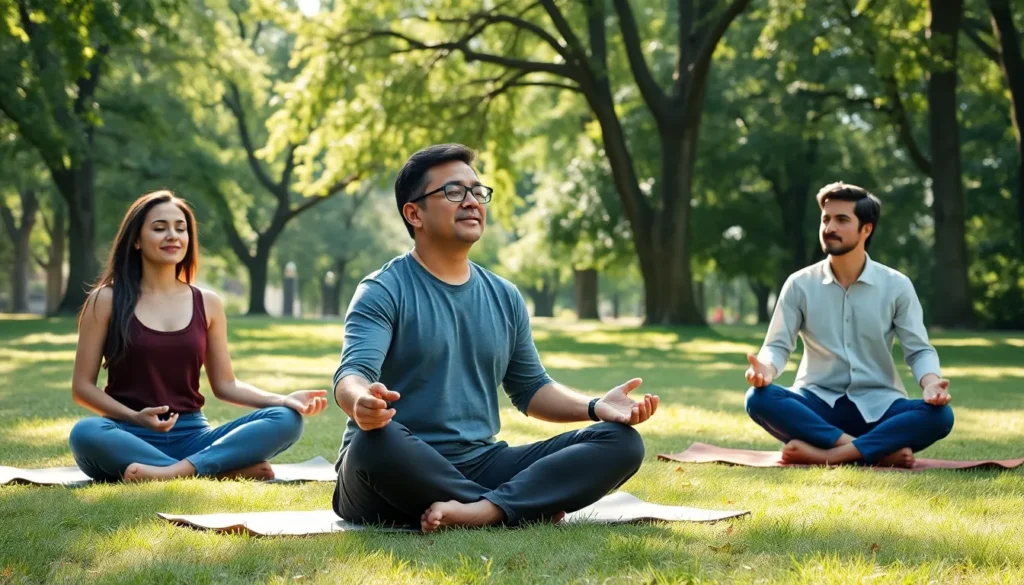Table of Contents
ToggleIn a world buzzing with distractions, finding a moment of peace can feel like searching for a needle in a haystack. Enter mindfulness—a simple yet powerful practice that can turn chaos into calm. If you’ve ever tried to meditate only to find your thoughts racing like a caffeinated squirrel, you’re not alone. Mindfulness isn’t about emptying your mind; it’s about embracing the present moment, even if that moment involves a few stray thoughts.
For beginners, diving into mindfulness might seem daunting, but it doesn’t have to be. With a few easy techniques and a sprinkle of humor, anyone can learn to navigate their thoughts like a pro. So grab a comfy seat, take a deep breath, and get ready to discover how mindfulness can transform everyday moments into extraordinary experiences. Who knew finding inner peace could be this fun?
What Is Mindfulness?
Mindfulness involves focusing attention on the present moment without judgment. It allows individuals to cultivate awareness of thoughts, feelings, and sensations, providing a pathway to greater calmness.
Historical Background
Mindfulness originated from ancient contemplative practices, particularly in Buddhism. The practice dates back over 2,500 years, where it served as a tool for achieving mental clarity and spiritual development. In the late 20th century, mindfulness gained traction in the West. Jon Kabat-Zinn popularized it through the Mindfulness-Based Stress Reduction program, which emphasized its therapeutic benefits. By integrating mindfulness techniques into daily living, people from various cultures began to experience significant emotional and mental health improvements.
Key Principles of Mindfulness
Several key principles form the foundation of mindfulness practice. First, non-judgmental awareness allows individuals to experience thoughts and emotions as they are. Second, focusing on the present moment encourages attention on current experiences rather than past regrets or future worries. Third, accepting one’s thoughts fosters compassion towards oneself. Finally, cultivating a sense of curiosity enhances the ability to observe experiences without labeling them. Practicing these principles leads to increased self-awareness and emotional resilience, crucial for navigating life’s challenges.
Benefits of Mindfulness for Beginners

Mindfulness offers numerous advantages, particularly for those starting their journey. It enhances mental and physical well-being.
Mental Health Benefits
Improved mental health ranks among the top benefits of mindfulness. Stress reduction occurs naturally through mindful practices. Anxiety levels decrease as individuals learn to manage racing thoughts. Enhanced emotional regulation emerges, supporting better responses to challenging situations. Increased self-awareness helps individuals identify triggers and patterns in their emotions. Research from sources such as the American Psychological Association indicates that regular mindfulness practice leads to lower rates of depression and anxiety. Overall, mindfulness fosters a healthier mindset, promoting a sense of peace.
Physical Health Benefits
Physical health also sees significant improvements with mindfulness. Reduced blood pressure results from consistent mindfulness practices. Heart rate stabilizes, benefiting overall cardiovascular health. Immune system functioning enhances as stress diminishes, leading to better health outcomes. Mindfulness can improve sleep quality, contributing to increased energy and focus during the day. According to data from the National Institutes of Health, participants in mindfulness programs report fewer health issues and improved overall well-being. These physical benefits highlight mindfulness as a comprehensive approach to enhancing quality of life.
How to Practice Mindfulness
Practicing mindfulness can feel accessible and rewarding. Beginners can embrace simple techniques to cultivate awareness and presence.
Simple Techniques for Beginners
Breathing exercises provide a great starting point. Focusing on inhaling and exhaling promotes relaxation and clarity. Observing sensations through mindful walking helps connect with the environment, encouraging presence. Body scans invite individuals to notice physical sensations without judgment, enhancing self-awareness. Engaging in guided meditations allows beginners to follow soothing instructions, making the practice more approachable. Journaling thoughts and feelings can help clarify emotions and intentions, further reinforcing mindfulness.
Establishing a Mindfulness Routine
Creating a mindfulness routine involves consistency and intention. Setting aside specific times each day fosters a habit, whether practiced in the morning or before bed. Short sessions of five to ten minutes can effectively build the habit without overwhelming beginners. Incorporating mindfulness into daily activities, like eating or commuting, promotes continuous awareness throughout the day. Finding supportive resources, such as apps or local classes, can enhance motivation and provide structure. Gradually increasing the duration and complexity of practices encourages continued growth and deeper engagement in mindfulness.
Common Challenges in Mindfulness Practice
Mindfulness practice presents several challenges for beginners. Understanding these can streamline the journey towards a more mindful life.
Overcoming Distractions
Distractions often disrupt mindfulness. Beginners may find it hard to focus as thoughts wander to past regrets or future worries. Recognizing these distractions represents the first step in overcoming them. Techniques such as focusing on breath or using guided meditations can help bring attention back to the present. Practicing mindfulness in shorter sessions initially can also reduce the tendency to become overwhelmed. Gradually increasing the duration fosters better focus. It’s essential to accept that distractions are part of the process, not a failure.
Managing Expectations
Unrealistic expectations can hinder progress in mindfulness. Beginners might anticipate immediate tranquility but often experience restlessness or frustration initially. Accepting that mindfulness is a journey allows for more realistic goals. Focusing on small wins, such as an increase in awareness or moments of calm, proves beneficial. Celebrating these moments reinforces motivation. Understanding that mastery takes time is critical for sustaining long-term practice. Mindfulness involves growth and learning rather than perfection.
Embracing mindfulness opens the door to a more peaceful and fulfilling life. Beginners can find joy in the practice by focusing on the present moment and cultivating self-awareness. With simple techniques and a lighthearted approach, anyone can incorporate mindfulness into their daily routine.
As they navigate distractions and manage expectations, it’s essential to remember that mindfulness is a journey. Each small step taken contributes to greater emotional resilience and well-being. By committing to this practice, individuals can experience profound benefits that enhance both mental and physical health.
Ultimately, mindfulness offers a valuable tool for anyone seeking to enrich their lives and foster a deeper connection with themselves and the world around them.







